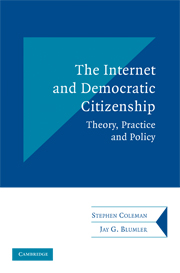Book contents
- Frontmatter
- Contents
- Acknowledgements
- Introduction: Anxiety and Optimism about Democracy
- 1 Democracy's Deliberative Deficit
- 2 A Crisis of Public Communication
- 3 From Indirect to Direct Representation
- 4 E-Democracy from Above
- 5 E-Democracy from Below
- 6 Shaping E-Democracy
- 7 Realising the Democratic Potential of the Internet
- Bibliography
- Index
- Titles in the Series
6 - Shaping E-Democracy
Published online by Cambridge University Press: 05 June 2012
- Frontmatter
- Contents
- Acknowledgements
- Introduction: Anxiety and Optimism about Democracy
- 1 Democracy's Deliberative Deficit
- 2 A Crisis of Public Communication
- 3 From Indirect to Direct Representation
- 4 E-Democracy from Above
- 5 E-Democracy from Below
- 6 Shaping E-Democracy
- 7 Realising the Democratic Potential of the Internet
- Bibliography
- Index
- Titles in the Series
Summary
What policies and strategies, techniques and technologies are required to foster democratic citizenship? Are there effective ways of encouraging citizens to become more actively engaged in the political process? Are such policies or strategies as likely to affect the unconfident, less educated and under-resourced as much as those who are the traditional participants in the democratic process? Can the quality of democratic interactions at various levels of political life be enhanced as a result of policy designs and implementation?
We know surprisingly little about the ways in which policies of various kinds impinge upon the making and maintenance of democratic citizens. As Mettler and Soss have stated:
Political science stops short of exploring public policies' influence on what citizens want, how strongly they want it, and whether they engage the political processes that hold the power to supply or deny it to them … Political scientists should be able to explain why some policies draw citizens into public life and others induce passivity. We should have a sense of how living under a given policy regime affects citizens' goals, beliefs, identities – and hence the possibilities and limits for future political action.
(Mettler and Soss 2004: 56)We regard Mettler and Soss's argument as offering an important insight into the weakness of much contemporary discussion about the promotion by government of policies for more active, inclusive or reflective citizenship.
- Type
- Chapter
- Information
- The Internet and Democratic CitizenshipTheory, Practice and Policy, pp. 139 - 165Publisher: Cambridge University PressPrint publication year: 2009
- 1
- Cited by



